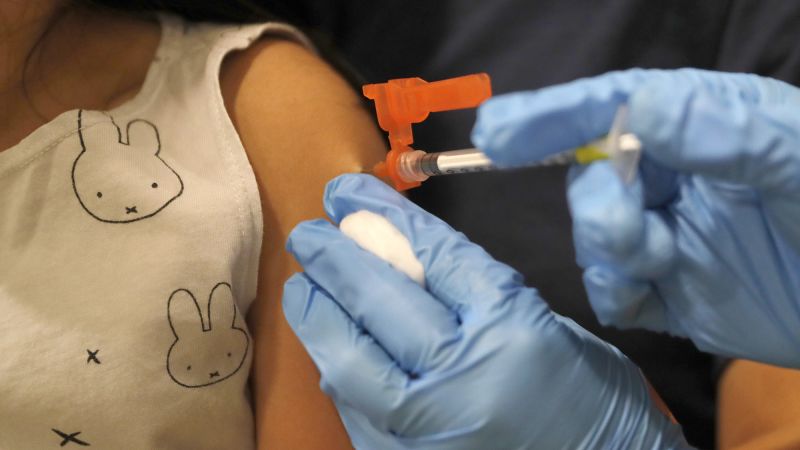Parents in the United States who want to vaccinate their young children against Covid-19 may face a growing set of challenges this fall.
The US Food and Drug Administration might not renew authorization for Pfizer’s Covid-19 vaccine for children younger than 5, the US Centers for Disease Control and Prevention told state and local health officials on Friday.
“This decision would affect Pfizer’s pediatric COVID-19 vaccine for children aged 6m–4y for the 2025–2026 season,” the CDC’s National Center for Immunization and Respiratory Diseases said in an email that was obtained by CNN.
In May, US Health and Human Services Secretary Robert F. Kennedy Jr. announced that the CDC would no longer recommend Covid-19 vaccines for healthy children or pregnant women. The CDC’s immunization schedule was updated to reflect that children would be able to get the vaccines after consulting with a health care provider — what’s known as “shared decision-making.”
But without FDA authorization, Pfizer’s Covid-19 vaccine would no longer be available to any children younger than 5 and the other option available for healthy children with no underlying conditions in this age group, Moderna’s Covid-19 vaccine, would have to be given “off label” by a willing pharmacist or physician.
This contradicts the intent of shared clinical decision-making, said Dr. Paul Offit, a pediatrician and director of the Vaccine Education Center at Children’s Hospital of Philadelphia.
“Shared clinical decision-making assumes that you’re making a decision for that child whether they’re healthy or not healthy. So now it’s confusing,” he said.
Covid-19 vaccines first became available to the American public during the pandemic under emergency use authorization, known as EUA — special permissions used by the FDA during an emergency that are short of full approval.
Pfizer has had full FDA approval for its Covid-19 vaccine for individuals age 12 and older since 2022. The company anticipates that this approval will expand to children ages 5 to 11 for the upcoming respiratory virus season, according to the email that the CDC’s National Center for Immunization and Respiratory Diseases sent to state and local health officials on Friday.
But vaccine access for the youngest children, who are most vulnerable to severe illness from a Covid-19 infection, would be significantly more limited if the FDA does not renew emergency authorization for the Pfizer vaccine for children under 5.
Pfizer confirmed to CNN that the FDA has said that it may not renew the emergency use authorization or the Pfizer-BioNTech Covid-19 vaccine for children ages 6 months to 4 years.
“We are currently in discussions with the agency on potential paths forward and have requested that the EUA for this age group remain in place for the 2025-2026 season,” Pfizer said in a statement. “It is important to note that these deliberations are not related to the safety and efficacy of the vaccine which continues to demonstrate a favorable profile.”
Fatima Khan, co-founder of the nonprofit grassroots group Protect Their Future, which advocates for vaccine access for kids, told CNN in a statement, that “taking a proven, safe and effective vaccine away from vulnerable children is unconscionable.”
“The science is clear: Infants face Covid-19 hospitalization rates comparable to those over 65. Refusing to authorize it for children under 5 doesn’t protect them–it abandons them,” she said. “Parents have already struggled to safeguard their youngest because of limited vaccine access. Now that protection may disappear entirely this fall just as schools reopen. If this stands, it will be a lasting stain on our public health system and on every leader who left our children behind.”
Moderna also has a Covid-19 vaccine available for children age 11 and younger. It was granted full approval by the FDA in July but only for those who are at “increased risk for COVID-19 disease.”
Moderna plans to increase vaccine supply for children to “help mitigate any potential supply gap,” according to the CDC email sent on Friday, but Moderna is still determining the specific volume and timing.
Like flu vaccines, Covid-19 vaccines have typically been updated with formulations that best target the virus strains that are in circulation each season. But the FDA has not yet approved the formulation for the 2025-2026 season.
“I think the bottom line is that children are going to be less likely to get this vaccine, which goes against the data,” Offit said.
At a meeting in April, the CDC’s vaccine advisory committee heard evidence that children accounted for about 4% of all Covid-19 hospitalizations over last fall and winter’s respiratory virus season.
Rates of Covid-19 hospitalizations among children are highest for the youngest age groups, CDC data shows. Last respiratory virus season, there were 48 Covid-19 hospitalizations for every 100,000 children under 5 – nearly seven times the rate for older children and more than twice the rate for adults under 50.
“It’s a war on mRNA vaccines. Why? Because mRNA vaccines are now political,” Offit said. “It’s just a war against the science, war against the data, and we will suffer this. And the thing that I fear the most is: Will we know we’re suffering this? Will we have the surveillance capacity to know who’s getting hospitalized with Covid, who’s dying from Covid?”
Covid-19 levels are on the rise in the US, with transmission increasing in at least 45 states, according to the CDC.
In a statement to CNN, the US Department of Health and Human Services said that the agency does not comment on potential regulatory changes.
“The COVID-19 pandemic ended with the expiration of the federal public health emergency in May 2023,” spokesperson Andrew Nixon said in an email. “Unless officially announced by HHS, discussion about future agency action should be regarded as pure speculation.”

